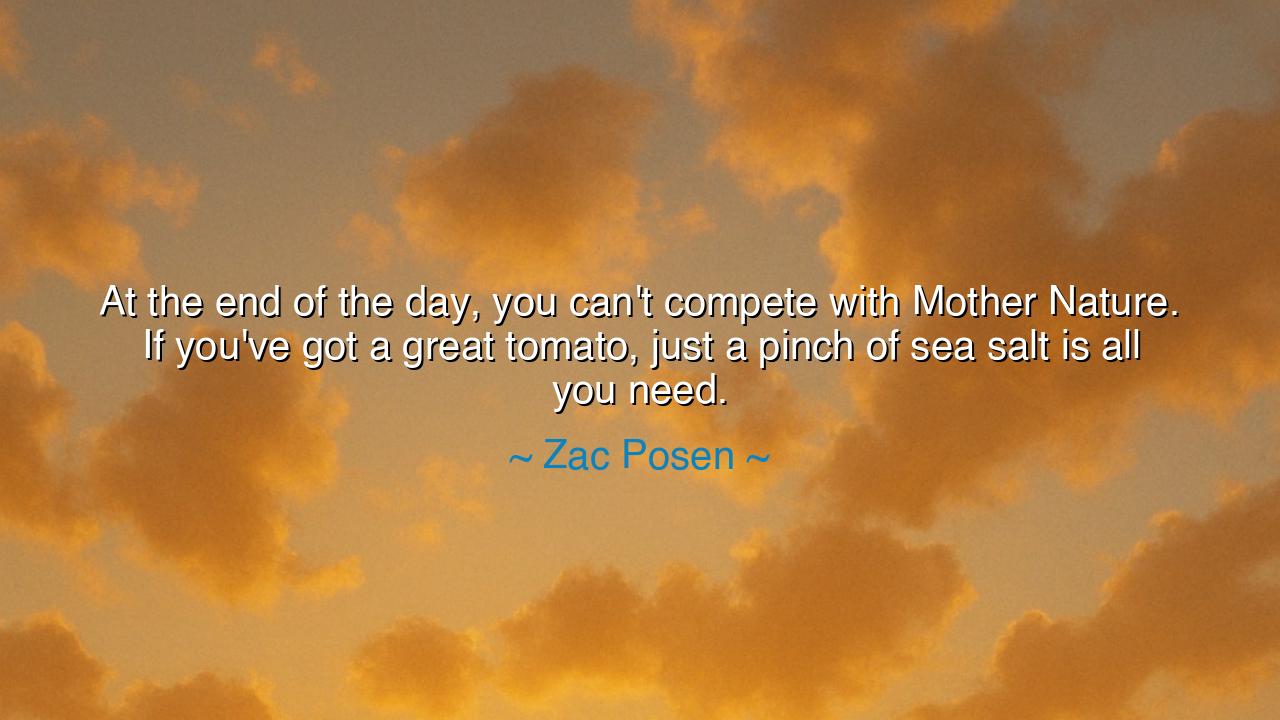
At the end of the day, you can't compete with Mother Nature. If
At the end of the day, you can't compete with Mother Nature. If you've got a great tomato, just a pinch of sea salt is all you need.






Zac Posen, the designer whose work has graced the grandest stages of fashion, once gave a lesson not in fabric, but in truth: “At the end of the day, you can’t compete with Mother Nature. If you’ve got a great tomato, just a pinch of sea salt is all you need.” Though spoken of food, his words carry the weight of philosophy. For he reminds us that the most perfect creations are not those born of man’s striving, but those given freely by Mother Nature—whole, simple, and complete in themselves.
The origin of this saying lies in the world of design and cuisine, where the temptation to embellish, to add, to overcomplicate is ever-present. Posen, who knew the allure of ornament and craft, also knew the danger of excess. Just as a ripe tomato shines brightest when left unspoiled, so too the works of man must sometimes step aside to let the natural order speak. The wisdom is ancient: simplicity reveals truth; unnecessary adornment clouds it.
This principle has echoed across ages. Consider the Japanese tea ceremony, where simplicity and restraint transform the smallest act of pouring tea into a sacred ritual. The power lies not in grandeur but in the purity of form, a philosophy captured in the word wabi-sabi—the beauty of the natural, the imperfect, the unadorned. Or think of the architects of the Parthenon, who, though they built with precision and grandeur, aligned their temple with the surrounding hills and sky, never striving to outshine nature but to stand in harmony with it. Both traditions whisper the same truth Posen declares: you cannot compete with nature—only honor it.
The meaning of his words is both emotional and heroic. They teach humility. Man may weave garments of splendor, forge monuments of stone, or cook with all the spices of the earth, but none of this surpasses the sun’s ripening of a tomato, the sea’s gift of salt, or the air’s gentle fragrance of herbs. To accept this is not defeat, but liberation—for when man ceases to compete with nature, he learns to walk alongside her, and in that companionship discovers a deeper artistry.
History warns us what happens when we forget this truth. The rulers of ancient Babylon sought to build the Tower of Babel, a monument meant to pierce the heavens and rival the divine order. Their ambition brought not glory, but confusion and scattering. By contrast, the farmer who tends his field in rhythm with the rains reaps abundance, not through dominance but through harmony. So too in our daily lives: when we impose excess where simplicity suffices, we create chaos; but when we honor the gifts of nature as they are, we find balance and joy.
The lesson is clear: live with reverence for simplicity. If you hold something beautiful, resist the urge to cover it with ornaments. Let its essence shine. If you have a friendship, do not complicate it with vanity—cherish it with honesty. If you have a task, do not smother it with needless effort—approach it with clarity and purpose. As the ripe tomato with sea salt needs nothing more, so too the truest things in life require little beyond recognition and gratitude.
Practically, this means embracing restraint in your own art, work, and living. Before adding, ask yourself if addition is truly needed. Seek to align your choices with nature’s wisdom rather than against it. When eating, savor the simple foods of the earth; when creating, let nature’s patterns inspire rather than compete. Above all, cultivate humility: remember that your greatest works are but echoes of what nature has already given.
Thus, Zac Posen’s words endure as a reminder that Mother Nature is the first and greatest artist, and our task is not to overshadow her, but to honor her gifts. The ripe fruit, the flowing river, the rising sun—these need no embellishment, only reverence. Let us then live as students of her simplicity, applying just enough of our craft to reveal her brilliance, and remembering always that her beauty, once unveiled, needs no rival.






AAdministratorAdministrator
Welcome, honored guests. Please leave a comment, we will respond soon